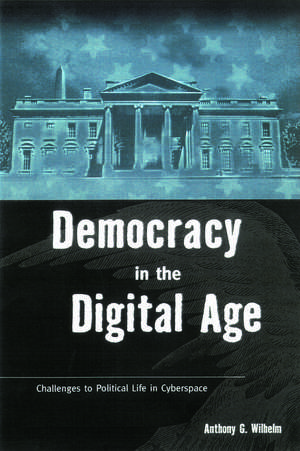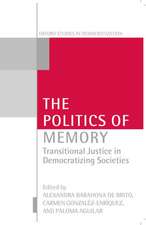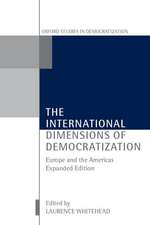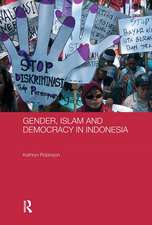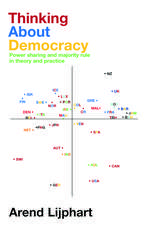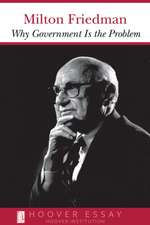Democracy in the Digital Age: Challenges to Political Life in Cyberspace
Autor Anthony G. Wilhelmen Limba Engleză Paperback – 20 ian 2000
| Toate formatele și edițiile | Preț | Express |
|---|---|---|
| Paperback (1) | 322.42 lei 6-8 săpt. | |
| Taylor & Francis – 20 ian 2000 | 322.42 lei 6-8 săpt. | |
| Hardback (1) | 985.29 lei 6-8 săpt. | |
| Taylor & Francis – 20 ian 2000 | 985.29 lei 6-8 săpt. |
Preț: 322.42 lei
Preț vechi: 432.41 lei
-25% Nou
Puncte Express: 484
Preț estimativ în valută:
61.70€ • 65.97$ • 51.44£
61.70€ • 65.97$ • 51.44£
Carte tipărită la comandă
Livrare economică 17 aprilie-01 mai
Preluare comenzi: 021 569.72.76
Specificații
ISBN-13: 9780415924368
ISBN-10: 0415924367
Pagini: 192
Dimensiuni: 152 x 229 x 22 mm
Greutate: 0.31 kg
Ediția:1
Editura: Taylor & Francis
Colecția Routledge
Locul publicării:Oxford, United Kingdom
ISBN-10: 0415924367
Pagini: 192
Dimensiuni: 152 x 229 x 22 mm
Greutate: 0.31 kg
Ediția:1
Editura: Taylor & Francis
Colecția Routledge
Locul publicării:Oxford, United Kingdom
Notă biografică
Anthony G. Wilhelm is Director of Information and Communication Technology Research at the Tomás Rivera Policy Insitute, a national think tank that examines issues of concern to the Hispanic community. He also served as the Teledemocracy Project Coordinator at Claremont Graduate University's School for Politics and Economics.
Recenzii
"Democracy in the Digital Age is a long-needed and masterful alloy of political philosophy, Internet politics, technological history, and basic empirical research. It helps dispel many of the myths surrounding the Internet, and it rings with a passionate commitment to more democracy in the information age." -- Gary Chapman, Director, The 21st Century Project, University of Texas at Austin
"This is the most stimulating and carefully considered critique of the issues around electronic democracy that I have seen for some time. It powerfully skewers many of the more absurd claims of the new futurists and grounds the debate in the real world of political practice." -- Brian D. Loader, editor of The Governance of Cyberspace
"Wilhelm's Democracy in the Digital Age has the most thorough and sensible review of contemporary thought on the social construction of technological construction of society.--Philip Howard, Northwestern University."
"Democracy in the Digital Age provides a first-rate study of the problems and promises posed by a 'cyberdemocracy.' Wilhelm's analysis of online public life is empirically grounded and theoretically sophisticated. Anyone interested in the democratic potential of the new information and communication technologies should review his recommendations, particularly the proposed policy responses to America's growing 'digital divide.'." -- Timothy W. Luke, Virginia Polytechnic Institute and State University
"This is the most stimulating and carefully considered critique of the issues around electronic democracy that I have seen for some time. It powerfully skewers many of the more absurd claims of the new futurists and grounds the debate in the real world of political practice." -- Brian D. Loader, editor of The Governance of Cyberspace
"Wilhelm's Democracy in the Digital Age has the most thorough and sensible review of contemporary thought on the social construction of technological construction of society.--Philip Howard, Northwestern University."
"Democracy in the Digital Age provides a first-rate study of the problems and promises posed by a 'cyberdemocracy.' Wilhelm's analysis of online public life is empirically grounded and theoretically sophisticated. Anyone interested in the democratic potential of the new information and communication technologies should review his recommendations, particularly the proposed policy responses to America's growing 'digital divide.'." -- Timothy W. Luke, Virginia Polytechnic Institute and State University
Cuprins
Introduction 1. Cyberdemocracy's Troubled and Frothy Surface Neofuturists, Dystopians, and Technorealists Research on the Democratic Potential of New Communications Technologies Beyond the Mere Smoke of Opinion 2. Shaping Virtual Civic Spaces Antecedent Resources and the Threshold of Political Functioning Inclusiveness in Online Public Life Deliberation and Light-Speed Telecommunications Technologies Designing a Democratic Future 3. Resource Requirements of Digitally Mediated Political Life Toward a Resource Model of Telecommunications Access Data Methods Thic Description of Teletechnology Access and Use Noneconomic Barriers The Causal Priority of Family and Education 4. Immune to Progress: Reconceptualizing America's Information and Telecommunications Underclass A Tale of Two Cities Expanding the Definition of Information Poverty: A Periphery-Center Model Data and Methods A New Classification of Information and Technology Poverty 5. Virtual Sounding Boards: How Deliberative is Online Political Discussion? Exploratory Questions Why Content Analysis? Content Categories The Vast Cyberwasteland? Irrigating the Wasteland 6. Designer Democracy Becoming Digital: The Prospects for Home-Based Cyberdemocracy Bypassing Poor Neighborhoods, Communities of Color, and Rural America Public-Access Workstations and Community Building Opening the Space of Flows 7. Catching the Red Queen: Public-Policy Rennovations The Difference Principle Toward Ubiquitous Deployment of Advanced Services Enhancing Deliberation in Online Political Forums Political Multicasting: An Enduring Public Trusteeship 8. Conclusion: Media Campaigns and the New International Appendix A1: Logistic Regression Analysis of Home Computer Ownership Appendix A2: Logistic Regression Analysis of Home Modem Ownership Appendix A3: Logistic Regression Analysis of Digitally Mediated Political Engagement Appendix B: List of (Self-Identified) Political Usenet and AOL Forums References Index
